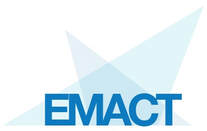EMACT Festival
The EMACT theater season features the Community Theatre State Drama Festival in odd-numbered years. During this event, professional adjudicators select two groups to represent the state of Massachusetts at the Regional Festival. The winner of the Regional Festival proceeds to the National Festival, which is sponsored by AACT.
This popular weekend event welcomes 16 to 24 participating companies, offering a unique opportunity to witness diverse theatrical performances. Professionals evaluate Each production regarding direction, acting, and technical and creative aspects. The weekend concludes with a closing ceremony recognizing outstanding performances and celebrating theatrical excellence.
The roots of the EMACT Festival date back to 1954 when the Brainwey Players of Braintree and Weymouth invited three Little Theatre League (LTL) companies, a state association of community theaters, to join a one-act competition. Over time, the event has evolved to include cuttings from full-length productions and one-act plays, encompassing both plays and musicals. EMACT-selected productions have advanced to the National Festival on at least five occasions in the past decade, winning the National Festival Award twice.
In 1961, the Festival was sponsored by the Community Theatre Division of the New England Theatre Conference (NETC), a regional theater arts organization. While the festival was held at various venues until 1966, it found a long-standing home on the campus of Brandeis University in 1967, where it remained until 2004, when it relocated to the campus of Babson College. More recently, the festival has been hosted at the Campbell Performing Arts Center at the Groton School, followed by Tewksbury High School.
In 1970, EMACT adopted the AACT rules and guidelines, including providing a 15-minute verbal critique of each performance by the Festival adjudicators. The festival aims to offer an optimal learning experience for all participating member groups, motivating them to strive for excellence and recognizing their efforts through adjudication. Additionally, the weekend often features theater workshops focusing on artistic and technical areas.
To ensure fairness, all theater companies must adhere to the same eligibility standards and requirements, including maximum time limits of 60 minutes for performance, 10 minutes for set-up, and 10 minutes for strike time. The presence of qualified and impartial adjudicators is vital for the success of the festival process, and productions must maintain the same form from the state level to the national festival.
The popularity of Theater Festivals as spectator events has grown significantly. Highly structured state, regional, and national competitions have evolved, often using the EMACT Festival, the oldest in the nation, as a model. EMACT takes pride in its contribution to the festival movement and its continued support of its goals.
This popular weekend event welcomes 16 to 24 participating companies, offering a unique opportunity to witness diverse theatrical performances. Professionals evaluate Each production regarding direction, acting, and technical and creative aspects. The weekend concludes with a closing ceremony recognizing outstanding performances and celebrating theatrical excellence.
The roots of the EMACT Festival date back to 1954 when the Brainwey Players of Braintree and Weymouth invited three Little Theatre League (LTL) companies, a state association of community theaters, to join a one-act competition. Over time, the event has evolved to include cuttings from full-length productions and one-act plays, encompassing both plays and musicals. EMACT-selected productions have advanced to the National Festival on at least five occasions in the past decade, winning the National Festival Award twice.
In 1961, the Festival was sponsored by the Community Theatre Division of the New England Theatre Conference (NETC), a regional theater arts organization. While the festival was held at various venues until 1966, it found a long-standing home on the campus of Brandeis University in 1967, where it remained until 2004, when it relocated to the campus of Babson College. More recently, the festival has been hosted at the Campbell Performing Arts Center at the Groton School, followed by Tewksbury High School.
In 1970, EMACT adopted the AACT rules and guidelines, including providing a 15-minute verbal critique of each performance by the Festival adjudicators. The festival aims to offer an optimal learning experience for all participating member groups, motivating them to strive for excellence and recognizing their efforts through adjudication. Additionally, the weekend often features theater workshops focusing on artistic and technical areas.
To ensure fairness, all theater companies must adhere to the same eligibility standards and requirements, including maximum time limits of 60 minutes for performance, 10 minutes for set-up, and 10 minutes for strike time. The presence of qualified and impartial adjudicators is vital for the success of the festival process, and productions must maintain the same form from the state level to the national festival.
The popularity of Theater Festivals as spectator events has grown significantly. Highly structured state, regional, and national competitions have evolved, often using the EMACT Festival, the oldest in the nation, as a model. EMACT takes pride in its contribution to the festival movement and its continued support of its goals.
